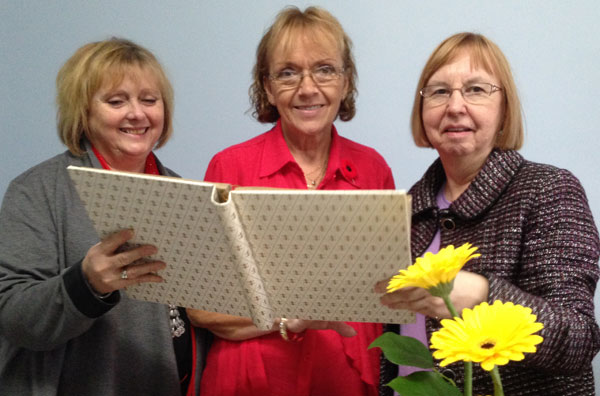‘Today, everybody has a story of how their life has been touched by Alzheimers’
Administrator | Nov 06, 2013 | Comments 0

Melanie Payne, left, and Linda Steacy look over photograph albums with Linda Jackson, centre, during her retirement open house.
Friends, peers, clients and caregivers wished Linda Jackson well on the occasion of her retirement from a 26-year career as executive director with the Alzheimer Society in Prince Edward County.
Jackson had become a volunteer in January 1985 after attending a public awareness meeting. There was no “society” at that time but Prince Edward became one of 10 chapters in the society in 1987. There are now 37 chapters. Jackson was Prince Edward’s first staff member in January 1990 – and the only staff member until 1999.
“Nobody had really heard of Alzheimers back then but we met with Debbie MacDonald Moynes at Community Care for Seniors and applied for some New Horizons money to make it happen,” said Jackson. “Now, Alzheimers and related dementias touch just about everybody’s lives. Everybody has a story of how their life has been touched by Alzheimers in some way. We’re living longer and better and diagnosis is much better today.
“It used to be simply called senility, or just old age,” said Jackson, recalling the 2006 movie “Away From Her” starring Gordon Pinsent.
The movie is based on Alice Munro’s short story The Bear Came Over the Mountain and in it, Pinsent follows directions from the nursing home not to visit his wife for a month while she settles in. When he went back to see her, she no longer remembered him.
“That’s the way it was back then but we now know that is wrong and the more often we visit, and share familiar things, the better.”
Jackson also recommends reading the book Still Alice by Lisa Genova, which is the story of a Harvard professor in her 50s who has early on-set Alzheimers.
“It’s a wonderful book and I think it encompasses almost every client I have ever known.”
Jackson is planning a trip to the East Coast. Belleville’s Laura Hare will take over duties as interim director, pending a feasibility study by the Society.
A new report from the Alzheimer Society of Canada has been designed to help caregivers and patients understand the significant issues of loss and grief occurring in different ways at all stages in the journey.
“This ambiguous loss is different from the loss and grief of death because closure is not possible and the grief cannot be full resolved while the person with dementia is alive,” the report states.
As the disease progresses, the person with dementia may not be able to understand or express the losses and grief he is experiencing but still may have a general feeling that something is wrong. Their grief may be expressed through feelings of being anxious or agitated.
“Look for ways to make meaningful connections with the person each day. Focus on today rather than trying to find or bring back the person he was before the disease,” the report states. “Staying connected gives the person meaningful support that can ease his distress. As the symptoms progress over time, the person will be less able to express his thoughts and concerns. There are still ways to connect to the person and show your support, such as holding his hands, using a reassuring tone of voice. It’s also important to share your intimate knowledge of the person with dementia – personality, needs, interests, likes, dislikes, favourite activities and life history – with any staff providing care so they are better able to support and connect with that person as a unique individual.”
“You have to put the person you knew behind you and make a relationship with the person in front of you” – Prue Teagle, caregiver.
Getting one-on-one counselling and support from Alzheimer Society staff or health professionals can also help patients and caregivers understand and grieve the losses, and learn how to ease their effects.
Visit www.alzheimer.ca for more information.
Visit, or call the Prince Edward County Alzheimer Office at 90 King St., Picton (corner Paul and King) for information, resources, education, support and counselling. 613-476-2085
Filed Under: Local News
About the Author:































